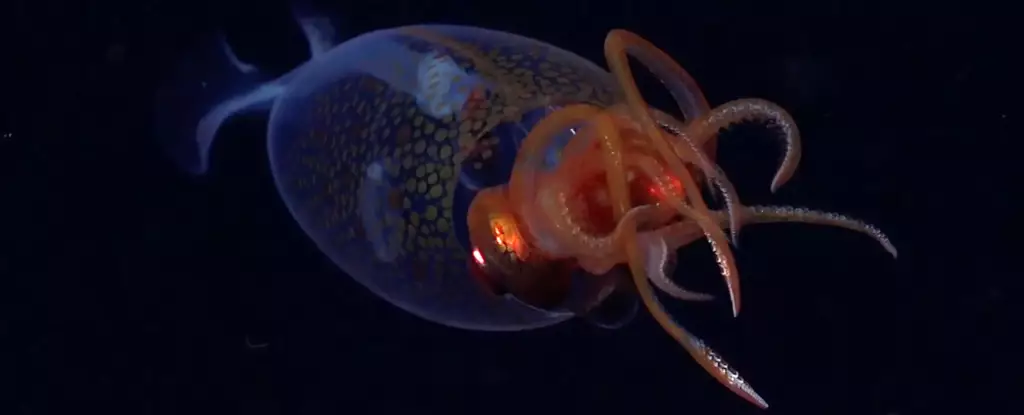The colossal squid, one of the ocean’s most enigmatic inhabitants, has finally emerged from the shadows of legend and deep-sea obscurity. For centuries, tales of giant squids battling monstrous sperm whales have filled the imaginations of seafarers and adventurers alike. But lurking even deeper in the icy waters of the Southern Ocean is the colossal squid, a creature so elusive that its existence was only confirmed in the early 20th century. The recent footage capturing a live colossal squid in its natural habitat marks a remarkable milestone, not just for marine biology but for our understanding of the mysteries that the ocean still holds.
This recent revelation serves as a stark reminder of how much we still have to uncover about our planet’s waters. It’s astonishing to think that despite advances in technology and exploration, certain aspects of marine life remain shrouded in mystery. The colossal squid reached a staggering weight of up to 1,100 pounds and could stretch over 23 feet long, yet it is only now that we get to witness this extraordinary being beyond the fleeting images of dying specimens observed at the ocean’s surface. The footage, which comes from a remotely operated vehicle known as SuBastian, was taken at a depth of 600 meters, showcasing the squid in a rare moment of vitality, thereby amplifying the allure and the unknowns surrounding its existence.
From Myth to Reality
The journey from myth to reality for the colossal squid is a potent reflection of humanity’s relationship with nature. Each new discovery prompts us to grapple with the vastness of the unknown and reconsider our position within the tapestry of life that the oceans embody. Kat Bolstad, a squid researcher involved in confirming the squid’s identification, articulates the excitement of such under-explored phenomena. Her enthusiasm illuminates the significance of these findings, hinting at both the beauty and fragility of deep-sea ecosystems.
However, there’s an undeniable tension in this saga. While the discovery of the living colossal squid captivates our wonder, one must also consider the implications of our ceaseless quest for knowledge. Our deep-sea explorations, intended to illuminate the obscure, could inadvertently spell doom for these remarkable creatures. Pollution, climate change, and exploitation of ocean resources pose dire threats that might soon drown out the ethereal beauty science seeks to unveil. The thrill of discovery is two-fold: it invigorates our scientific spirit while simultaneously reminding us of the potential havoc we wreak on the planet’s delicate balance.
A Glimpse at Adaptation
In their stark, frigid habitat, colossal squids embody a harrowing adaptation to life in extreme conditions. These creatures possess some of the largest eyes in the animal kingdom, enabling them to navigate and hunt in pitch darkness where light barely penetrates. The remarkable adaptations, such as the rotating hooks on their tentacles, echo a profound evolutionary narrative, underscoring the ingenuity of life forms that have existed long before the advent of humanity.
The scientific community’s excitement, as evidenced by Aaron Evans’ exuberant reaction to identifying the squid’s unique features, exemplifies the emotional connection that researchers forge with their subjects. It matters not just as a groundbreaking sighting, but as a momentous occasion signifying a deeper understanding of marine life. However, this joy has to be tempered with the realization that, even as we unravel the mysteries of the ocean, we must tread lightly, for every revelation comes with its own set of responsibilities.
The Next Frontier of Exploration
Unfortunately, the narrative surrounding the colossal squid isn’t solely one of beauty and excitement; it triggers a poignant caution. As expeditions like those from the Ocean Census continue their quest for knowledge, it’s crucial to acknowledge that while we discover, we must also safeguard the deep. Each new finding must be viewed in the context of conservationism, a call to action that resonates fiercely with the principles of center-wing liberalism.
Our engagement with the ocean should evolve beyond mere curiosity; it must morph into stewardship. The colossal squid is not just a creature to be studied; it stands as a symbol of the uncharted territory that remains within our reach. In unveiling the wonders of the deep, can we also find the resolve to protect it? Only time will tell whether humanity chooses to act as guardians of this mesmerizing yet vulnerable world.



Leave a Reply